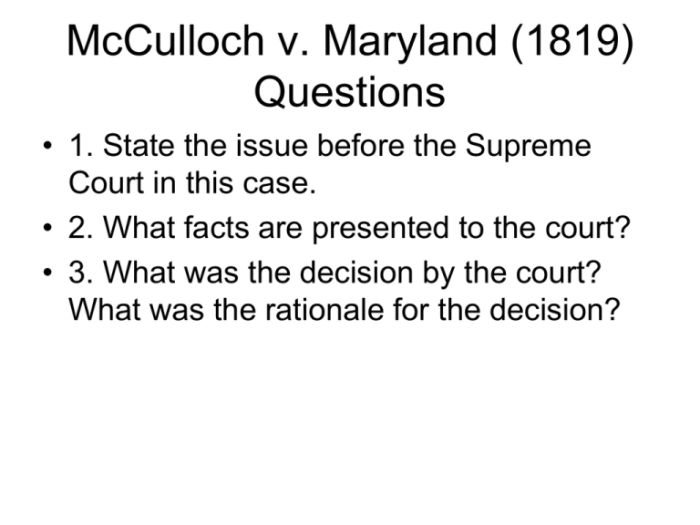Mcculloch v maryland worksheet answers – The landmark case of McCulloch v. Maryland worksheet answers delves into the intricate relationship between the federal government and the states, shaping the very fabric of American constitutional law. This case established the principle of implied powers, empowering the federal government to enact laws beyond those explicitly enumerated in the Constitution.
The McCulloch v. Maryland case arose from a dispute over the authority of the federal government to establish a national bank. The state of Maryland attempted to tax the Baltimore branch of the Second Bank of the United States, arguing that the federal government lacked the power to create such an institution.
The Supreme Court, in a landmark decision authored by Chief Justice John Marshall, ruled in favor of the federal government, establishing the principle of implied powers.
1. McCulloch v. Maryland Case Overview: Mcculloch V Maryland Worksheet Answers
The McCulloch v. Maryland case is a landmark Supreme Court decision that established the principle of implied powers and strengthened the authority of the federal government. In 1816, the state of Maryland attempted to tax the Baltimore branch of the Bank of the United States, which was chartered by Congress.
The bank refused to pay the tax, arguing that it was unconstitutional because the federal government had no implied power to create a bank.
Key Arguments
The state of Maryland argued that the federal government only had the powers that were explicitly stated in the Constitution. The bank argued that the Constitution granted the federal government implied powers that were necessary to carry out its enumerated powers.
Impact
The Supreme Court ruled in favor of the bank, holding that the federal government had implied powers and that the Bank of the United States was a necessary and proper means of carrying out the federal government’s fiscal responsibilities. This decision greatly expanded the power of the federal government and established the principle of implied powers.
2. Constitutional Principles Established by McCulloch v. Maryland
Implied Powers
The McCulloch v. Maryland case established the principle of implied powers, which allows the federal government to exercise powers that are not explicitly stated in the Constitution but are necessary to carry out its enumerated powers.
Necessary and Proper Clause
The “necessary and proper” clause of the Constitution, which gives Congress the power to make laws that are “necessary and proper” for carrying out its enumerated powers, was central to the Supreme Court’s decision in McCulloch v. Maryland.
Scope of Federal Authority
The decision in McCulloch v. Maryland significantly expanded the scope of federal authority by giving the federal government the power to create and operate institutions that are not explicitly mentioned in the Constitution, such as the Bank of the United States.
3. Historical Context and Background

Economic and Political Factors
The McCulloch v. Maryland case was influenced by economic and political factors, including the desire to create a stable national currency and the growing tension between the federal government and the states.
Role of Chief Justice John Marshall
Chief Justice John Marshall played a key role in shaping the outcome of the McCulloch v. Maryland case. His opinion for the Court established the principle of implied powers and strengthened the authority of the federal government.
4. Legal and Constitutional Analysis
Legal Arguments
The legal arguments presented in McCulloch v. Maryland focused on the interpretation of the Constitution and the scope of federal power. The state of Maryland argued that the federal government only had the powers that were explicitly stated in the Constitution, while the bank argued that the Constitution granted the federal government implied powers that were necessary to carry out its enumerated powers.
Key Precedents, Mcculloch v maryland worksheet answers
The Supreme Court’s decision in McCulloch v. Maryland relied on several key precedents, including the decision in Gibbons v. Ogden, which established the federal government’s power to regulate interstate commerce.
Implications for Constitutional Interpretation
The decision in McCulloch v. Maryland had significant implications for future constitutional interpretation by establishing the principle of implied powers and expanding the scope of federal authority.
5. Impact and Legacy of McCulloch v. Maryland
Immediate Impact
The immediate impact of the McCulloch v. Maryland decision was to strengthen the authority of the federal government and establish the principle of implied powers.
Long-Term Implications
The long-term implications of the McCulloch v. Maryland decision have been profound, shaping the development of federalism in the United States and continuing to influence constitutional law today.
Examples
Examples of how the principles established in McCulloch v. Maryland continue to shape constitutional law today include the federal government’s power to regulate the economy, create and operate agencies, and establish national standards.
FAQs
What is the principle of implied powers?
The principle of implied powers allows the federal government to enact laws that are not explicitly enumerated in the Constitution but are necessary and proper for carrying out its enumerated powers.
How did the McCulloch v. Maryland case establish the principle of implied powers?
In McCulloch v. Maryland, the Supreme Court ruled that the federal government had the implied power to establish a national bank because it was necessary and proper for carrying out its enumerated powers to regulate commerce and collect taxes.
What is the significance of the McCulloch v. Maryland decision?
The McCulloch v. Maryland decision established the principle of implied powers, which has had a profound impact on the development of federalism in the United States. It has empowered the federal government to enact laws necessary to carry out its enumerated powers, shaping the balance of power between the federal and state governments.